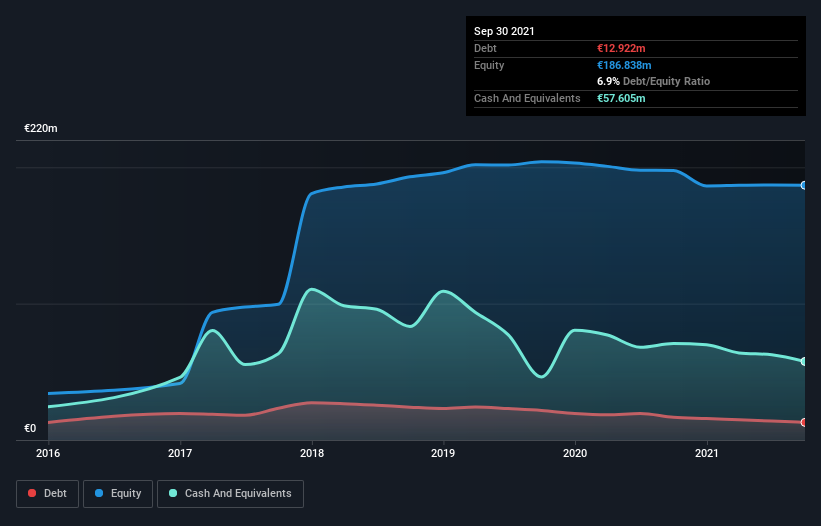Some say volatility, rather than debt, is the best way to think about risk as an investor, but Warren Buffett famously said that 'Volatility is far from synonymous with risk.' So it seems the smart money knows that debt - which is usually involved in bankruptcies - is a very important factor, when you assess how risky a company is. As with many other companies Aumann AG (ETR:AAG) makes use of debt. But the real question is whether this debt is making the company risky.
Why Does Debt Bring Risk?
Generally speaking, debt only becomes a real problem when a company can't easily pay it off, either by raising capital or with its own cash flow. In the worst case scenario, a company can go bankrupt if it cannot pay its creditors. While that is not too common, we often do see indebted companies permanently diluting shareholders because lenders force them to raise capital at a distressed price. Of course, the upside of debt is that it often represents cheap capital, especially when it replaces dilution in a company with the ability to reinvest at high rates of return. The first step when considering a company's debt levels is to consider its cash and debt together.
View our latest analysis for Aumann
What Is Aumann's Debt?
You can click the graphic below for the historical numbers, but it shows that Aumann had €12.9m of debt in September 2021, down from €16.6m, one year before. However, it does have €57.6m in cash offsetting this, leading to net cash of €44.7m.

How Strong Is Aumann's Balance Sheet?
We can see from the most recent balance sheet that Aumann had liabilities of €69.0m falling due within a year, and liabilities of €33.7m due beyond that. Offsetting this, it had €57.6m in cash and €101.5m in receivables that were due within 12 months. So it can boast €56.4m more liquid assets than total liabilities.
This excess liquidity suggests that Aumann is taking a careful approach to debt. Given it has easily adequate short term liquidity, we don't think it will have any issues with its lenders. Simply put, the fact that Aumann has more cash than debt is arguably a good indication that it can manage its debt safely. There's no doubt that we learn most about debt from the balance sheet. But it is future earnings, more than anything, that will determine Aumann's ability to maintain a healthy balance sheet going forward. So if you're focused on the future you can check out this free report showing analyst profit forecasts.
Over 12 months, Aumann made a loss at the EBIT level, and saw its revenue drop to €167m, which is a fall of 9.6%. That's not what we would hope to see.
So How Risky Is Aumann?
Although Aumann had an earnings before interest and tax (EBIT) loss over the last twelve months, it generated positive free cash flow of €1.9m. So taking that on face value, and considering the net cash situation, we don't think that the stock is too risky in the near term. We'll feel more comfortable with the stock once EBIT is positive, given the lacklustre revenue growth. When analysing debt levels, the balance sheet is the obvious place to start. But ultimately, every company can contain risks that exist outside of the balance sheet. We've identified 1 warning sign with Aumann , and understanding them should be part of your investment process.
Of course, if you're the type of investor who prefers buying stocks without the burden of debt, then don't hesitate to discover our exclusive list of net cash growth stocks, today.
New: Manage All Your Stock Portfolios in One Place
We've created the ultimate portfolio companion for stock investors, and it's free.
• Connect an unlimited number of Portfolios and see your total in one currency
• Be alerted to new Warning Signs or Risks via email or mobile
• Track the Fair Value of your stocks
Have feedback on this article? Concerned about the content? Get in touch with us directly. Alternatively, email editorial-team (at) simplywallst.com.
This article by Simply Wall St is general in nature. We provide commentary based on historical data and analyst forecasts only using an unbiased methodology and our articles are not intended to be financial advice. It does not constitute a recommendation to buy or sell any stock, and does not take account of your objectives, or your financial situation. We aim to bring you long-term focused analysis driven by fundamental data. Note that our analysis may not factor in the latest price-sensitive company announcements or qualitative material. Simply Wall St has no position in any stocks mentioned.
About XTRA:AAG
Aumann
Manufactures and sells specialized machines and production lines for electromobility, automation, and robot applications in Germany, rest of Europe, the United States, Canada, Mexico, China, and internationally.
Flawless balance sheet and undervalued.
Market Insights
Community Narratives



